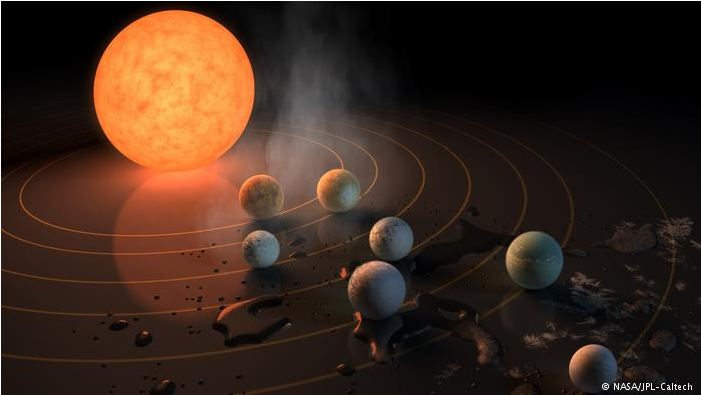Discovering new planets like seven worlds!
The seven planets in the Earth's radius are circling the 'sun', but one-tenth of the Sun's. The biggest feature of these planets is that there can be water.
Astronomers have already found the planet like the planet outside our solar system - but seven in one! Again around a star! Chakra can be realized.
Michelle Zillen and his teammates at the University of Leeds were discovered. Their survey was published on Wednesday in the journal Nature. All the newly discovered "On the surface, there may be liquid water, and even life rays," wrote Jillon in the article.


The newly discovered planets that are moving around the star, its scientific name is 'Trapist-1', not more than the Jupiter planet in volume. This dwarf star is 39 light years away from Earth.
The planet seven is being called up to 1h just for 1b, 1c etc. They are all very close to 'Trapist-1', far more than the distance from the Sun to the Earth.
This is possible, because 'Trapist-1' is much smaller and much more cold than the Sun, so the so-called, temperate, habitable area has come very close to the star - where the water does not evaporate or accumulate, ie the liquid will remain - ie from zero This 'habitable zone' is within 100 degree Celsius temperature.

Starlight
The light of 'Trapist-1' is not very bright. Amiri Tris, a joint writer of the study, astronomer at University of Cambridge. He said that the light of 'Trapist-1' will be like a part of the sunshine, which is 200%, that is, the light at the end of the sunset. But the light of 'Trapist-1' is at least stronger than our moon's light, so these planets will not be very cold - said Trian.
Most of the trappist-1's crystalline in the inferior spectrum, which we can not see. The idea of TRIE is that the sky may be light or dry.
Is there life there?
If the planets of 'Trapist-1' are in the sea and there life begins (in), then there is no danger. But if the life begins somewhere other than the sea, its 'living and dead' will depend on the amount of ray radiation towards the planet from 'Trapist-1'.
The next task will be to check the atmosphere or the atmosphere of these planets. Researchers will use James Web Space Telescope for this purpose - the telescope will be sent to space in 2018 and it will examine whether the newly discovered planets have methane, oxygen and ozone, these three gases. Having these three gas together means: There is a lot more chance of finding life there.

Planets are many, but habitable planets?
The first planet outside our solar system was discovered in 1992. When the distant planets pass through their stars, then the planets are detected. Thus, in the last ten years, thousands of planets have been discovered outside the solar system. Even now it is assumed that most stars have planets and the 'habitable zones' of those stars are often the world's planets. There are 100 billion Earth-like planets in the whole universe, where liquid water is possible ...
Or is the world possible?
Upvoted ☝ Have a great day!
Thanks,
thanks for infrom about planet..it is informative.
welcome
Nice things said
thanks,
Find out a lot about the planet for your post,thanks
Hello, please follow the rules of the group Steemit for Resteem ↕ and you will be resteemed by the most active members in the group.
You have to resteem a post from the group before you post yours there.
Here is : HOW TO RESTEEM ON STEEMIT ?
i will follow u , you can follow back and give the steemit gurop link i will join with your gurop thx .
https://www.facebook.com/groups/clixmoney/
Very good post. I love everything space, I study and read about it often, good info.
thanks
nice...
Very nice info!
awesome info
Great post. I follow you , and upvote.
i also back follow upvote and coment your post.
nice topic... carry on